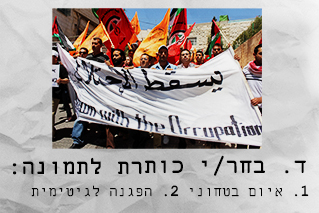 "Security threat or legitimate protest?"
צילום: קרן מנור, אקטיבסטילס
"Security threat or legitimate protest?"
צילום: קרן מנור, אקטיבסטילס
In letter sent yesterday to the Advocate General, ACRI says “closed military zone” orders served to Israeli activists in their homes constitute a severe violation of Palestinians’ and Israelis’ right to protest; the military must protect- not suppress – freedom of expression.
Attorney Raghad Jaraisy, Director of ACRI’s Freedom of Protest in the Occupied Territories Project, sent an urgent letter yesterday (November 12) to Major General Danny Efroni, Chief Military Advocate General, after “closed military zone” orders were issued directly to the homes of demonstrators and activists opposed to the occupation. The orders, delivered Sunday (November 11) by police officers from the Samaria and Judea Division, were signed by the GOC Central Command, and prohibit anyone aside from residents from entering or approaching the villages of Bil’in, Ni’lin, Nabi Salah, and Kafr Quddum on Fridays from now until March 2013. These are all villages in which weekly demonstrations have been held – and been violently dispersed by security forces – regularly on Fridays for the past several years.
Attorney Jaraisy urged the Advocate General to take action and cancel the orders. She also asked that Maj. Gen. Efroni clarify the regulations and procedures regarding the use of closed military zone orders to suppress nonviolent protests in the Occupied Territories.
The letter explains that the sweeping use of closed military orders to prevent demonstrations in the West Bank constitutes a severe violation of the freedom of expression of Palestinians residents, for whom demonstrations are practically the exclusive outlet for the expression of opposition to the actions of the regime in the area. The disproportionate use of these orders contravenes the International Convention on Civil and Political Rights (ICCPR), to which Israel is a party, and decisions of the Israeli Supreme Court, as well as the military’s own internal guidelines. Under each of these sources of law, the occupying power is obligated to balance the needs of security and preservation of public order against the freedom of expression.
“Israel, the occupying power, must allow freedom of expression and the right to protest to be exercised in full, and cannot limit these rights or violate them unless the anticipated harm to the security interests of the state is severe and immediate, and the probability [of such harm] reaches a level of near certainty,” the letter reads.
The police has openly declared that the move is designed to thwart the weekly demonstrations in these West Bank villages. These orders were issued “as part of the deliberate, offensive actions spearheaded by the commander of the district,” according to a statement by Samaria and Judea Police District. The police claim that the orders are being issued and delivered directly to the activists so that they cannot claim that they did not know that the areas in question were closed military zones.
Attorney Jaraisy: “Military and police forces have a distorted view of their duties in the West Bank: instead of defending the rights of the occupied population – in particular the right to demonstrate and the freedom of expression – they are limiting and restricting these rights without justification, in an unreasonable and disproportionate manner. One of the ways to suppress protests is to apply pressure on Israeli activists who identify with Palestinians through surveillance, harassment, and violation of privacy. The commanding ranks must internalize that not every demonstration constitutes a security threat worthy of suppression – especially not nonviolent demonstrations. Participation in demonstrations is first and foremost a right, not a threat.”
Click here to read the full letter to the Military Advocate General (in Hebrew).







